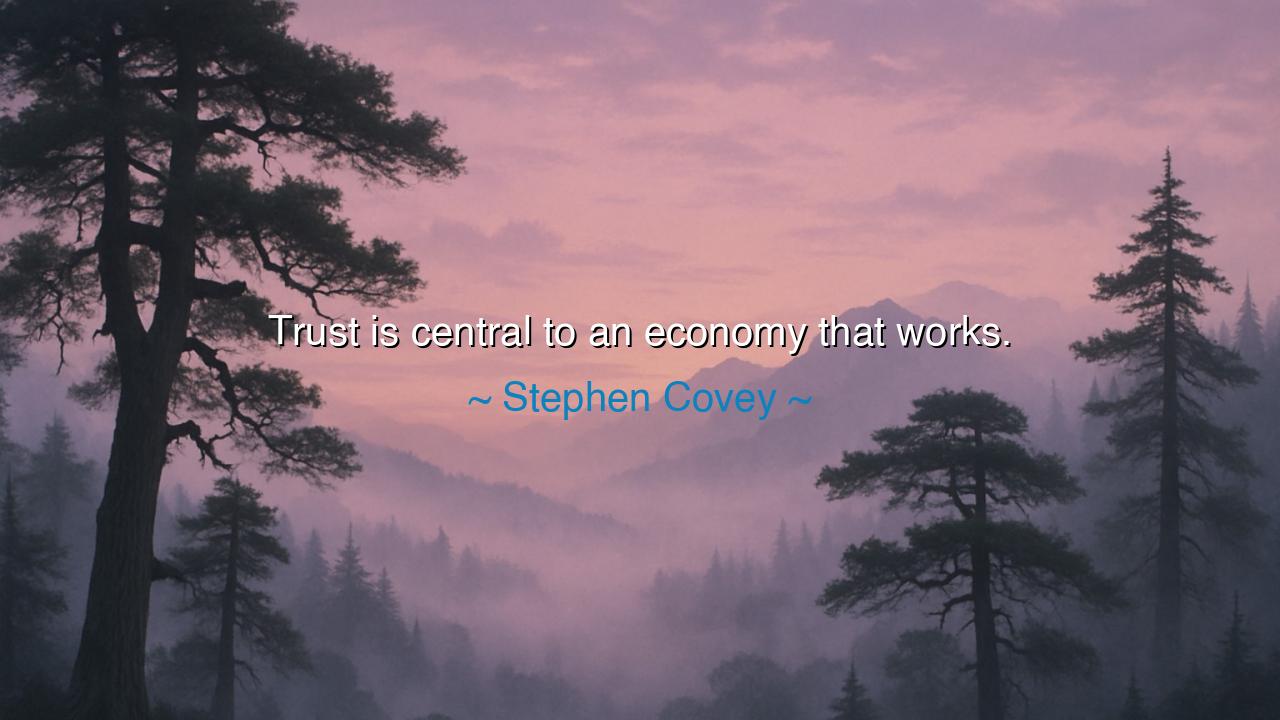
Trust is central to an economy that works.






Hear now the solemn wisdom of Stephen Covey: “Trust is central to an economy that works.” These words are not spoken lightly, for they pierce to the very heart of society’s order. An economy is more than coins and ledgers, more than goods exchanged in markets; it is a vast and living web of promises, expectations, and unseen bonds. And the thread that holds it together is not gold, nor power, nor law alone—it is trust. Without it, the web unravels, and with it, nations crumble into ruin.
For what is a contract if not the belief that the other shall keep his word? What is credit if not faith in future repayment? What is trade if not the confidence that the merchant delivers what he declares? Trust is the invisible currency, the sacred covenant that undergirds every coin, every bargain, every market stall and great exchange. Covey’s words remind us that economies do not function on mechanics alone—they breathe because men and women believe one another enough to trade, to invest, to risk.
History has shown us the devastation that follows when trust is broken. Recall the Great Depression of the 1930s. Banks fell, not only because of numbers on paper, but because the people’s faith collapsed. Citizens rushed to withdraw their savings, fearing collapse, and in that very act brought collapse into being. The engine of commerce stalled, not for lack of goods or labor, but for lack of confidence. Here we see Covey’s truth: when trust dies, so too does the economy’s strength.
Yet history also shows us the triumph of trust. Consider the rebuilding of Europe after the Second World War. Cities were rubble, treasuries were empty, yet through the Marshall Plan and new agreements, nations chose to trust one another again. Credit was extended, promises were made, cooperation blossomed, and prosperity rose from the ashes. Without trust between nations, no rebuilding could have taken place. Trust was the seed, and from it bloomed an era of growth and stability.
But Covey’s words reach further still. They remind us that trust is not only for governments and banks, but for daily living. When an employer believes in his workers, when neighbors keep their word, when families honor their commitments, the economy thrives—not because of abstract numbers, but because human bonds strengthen the flow of exchange. Where dishonesty reigns, commerce falters; where integrity thrives, wealth follows.
This wisdom is not new. The ancients also knew it. In Rome, a man’s fides—his faithfulness—was considered one of his highest virtues. Without it, his dealings in the forum collapsed, and his name was ruined. For the Roman understood what Covey declares anew: trust is central to an economy that works. The principle has endured through empires and ages, for it is a law as old as civilization itself.
Therefore, let the teaching be clear: guard your trustworthiness as a treasure, and grant your trust with discernment. In your own dealings—whether great or small—speak truth, honor your promises, and cultivate integrity. For each broken word weakens the fabric of society, and each kept promise strengthens it. If you would see prosperity in your home, your work, and your nation, then nurture trust, for it is the coin that never loses value, the wealth that cannot be stolen, the foundation upon which all flourishing rests.






AAdministratorAdministrator
Welcome, honored guests. Please leave a comment, we will respond soon